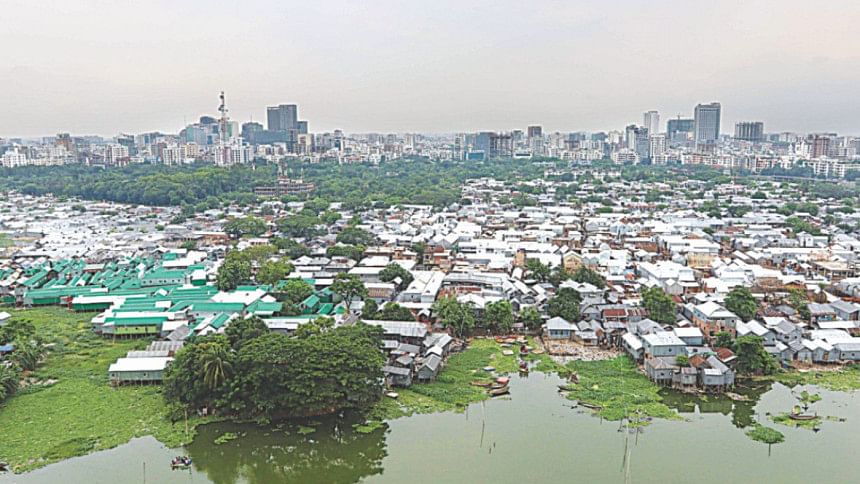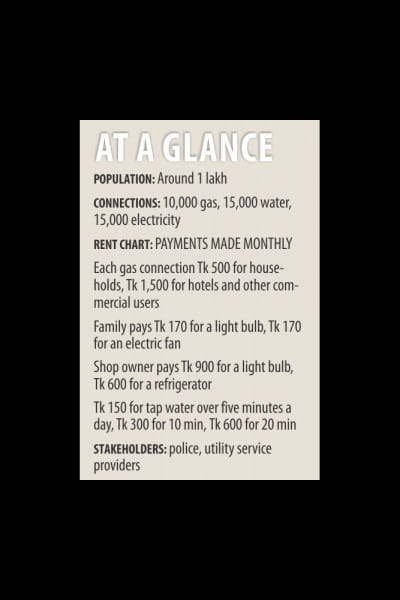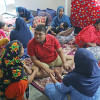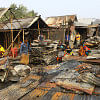KORAIL SLUM: Goons eating up public resources


At least 20 syndicates are making a fortune by providing gas, power and water illegally to people living in the capital's biggest slum, Korail Bosti.
They get an estimated Tk 1.5 crore per month from slum dwellers and a major portion of the money is spent to “manage” the local police station and a section of employees of the three utility service providers.
Home to around one lakh people, who include 28,000 voters, Korail Bosti is spread over 90 acres of government land in Mohakhali. People have been living there since 1990, according to government officials.
These correspondents talked to over 50 locals and several syndicate members to get an insight into the slum's complex web of money and power.
The residents reckon that there are at least 10,000 illegal gas connections, and 15,000 water and as many electricity connections at the slum.
Under the arrangements made by the syndicates, each gas connection costs at least Tk 500 for households and Tk 1,500 for hotels and other commercial users.
A family has to pay Tk 170 per month for using a light bulb and Tk 170 for an electric fan, residents say. A shop owner pays Tk 900 a month for a light bulb and Tk 600 for a refrigerator.
To get tap water for five minutes a day, one has to pay Tk 150 per month, for 10 minutes Tk 300 and for 20 minutes Tk 600.
Every syndicate has its own staff, including lineman, rent collector and manager. The number of staff depends on the number of homes their illegal services cover.
To set up the connections and run the unauthorised services, the syndicates get technical support from some employees of local water, power and gas supply offices in exchange for bribe.
Between 10th and 15th day of every month, the payment must be paid to the rent collectors appointed by the syndicates.
“In case of default, the lineman of the syndicate snaps the connection,” said Tohur Ali, 65, who lives in Ershadnagar area of Korail Bosti.
“Lineman restores the connection after we settle the bill.”
Nur Banu, who ran one of such syndicates for around two years till November 2015, told this newspaper that her collection was Tk 4 lakh per month.
“I had to pay Tk 1 lakh to Banani policemen, Tk 50,000 to the local power office, Tk 10,000 to local Wasa office and Tk 1 lakh to my staff,” she said.
Syndicates divide areas among themselves to run the illegal business and each one of them provides services to a certain number of houses.
For example, the syndicate run by Junaid, Nayeb Ali, Sohag and Natib Ali supply water and electricity to around 5,000 houses in Ershadnagar and Beltoli. A member of the syndicate said they get Tk 10 lakh per month from their areas.
One syndicate alone never provides all the three utility services.
Their illegal business had earlier led to bloodshed on several occasions. At least three syndicate members were killed in the last seven years in the slum over internal feuds or establishing supremacy, according to locals.
Nur Banu said her husband Dulal Sardar was killed by his rivals Junaid, Nayeb Ali and others in 2014. Those involved in the murder later grabbed her business after evicting her from her house in the slum in November 2015.
Mohammad Bashir, who was engaged in providing water service in the slum, was killed by rivals five years ago.
“Criminals first fired shots at his [Bashir's] house at TNT colony house injuring his child. A few days later, he was shot dead inside the slum,” a member of a syndicate said.
In another incident, one Mosharraf was killed six years back over establishing supremacy in the slum.
Earlier this year, a garment worker was raped at a house inside the slum allegedly by four goons involved with a syndicate, according to the FIR the victim filed with Banani Police Station.
Because of low house rents, hawkers, small shopkeepers, roadside vendors, rickshaw and van pullers, CNG drivers and domestic helps and workers involved in garment, construction and transport sectors live in Korail Bosti.
There are people who come from outside the capital to stay here for a certain period of time following natural disasters like river erosion and flood.
The number of slum dwellers increases before the Eid-ul-Azha, Eid-ul-Fitr and Shab-e-Barat.
“You will get an 80 to 100 sq-feet room at Tk 1,500 to 2,500 per month excluding the utility service costs,” said Moyez Ali, who lives in Jamai Bazar area of Korail Bosti.
Around 30,000 families living in the slum get electricity and water services while almost all the families have gas facility to cook meal, Abdus Sobhan, president of Korail Bosti Unnayan Committee-1, told The Daily Star.
Mofizur Rahman, elected councillor of ward-20, said all gas connections at the slum are illegal and the lines pose a very high risk of danger.
And fifty percent of water and electricity supplies are unauthorised, said the councillor and several other well-informed sources.
Mofizur added they are trying to legalise all the services.
Banani Police Station Officer-in-Charge (investigation), Md Abdul Matin, binned as baseless the allegation against police of taking bribe from the syndicates.
“We don't allow illegal utility services in the slum,” Matin said.
He also added that the Banani Police Station assist the mobile court when it launches drive against illegal connections.
Israfil Hossain Akanda, executive engineer of Water Supply and Sewerage Authority (Wasa), Mohakhali, said he has no idea about any syndicate illegally supplying water to slum people with the assistance of dishonest Wasa staffs.
He added Wasa has installed 1,000 meters with connections to provide water to the slum's low-income people.
Local officials claim their services cover the entire Korail slum.
But several syndicate members wishing anonymity said Wasa's meters are connected to around 10,000 houses. And the syndicates are providing water supply to 20,000 to 25,000 houses.
Md Kamrul Islam, sub-divisional engineer of Dhaka Electric Supply Company (Desco), Gulshan office, said they have set up 35 large-size “pole meters” to supply power to the slum people.
However, no official could say exactly how many Korail residents get power supply through those meters. Some syndicate members and locals said Desco can supply electricity to 4,000 to 5,000 houses.
Officials of Titas Gas Transmission and Distribution Company Limited say they don't provide any gas connection to Korail slum.
HM Ali Ashraf, director (operations) of Titas Gas, said he has lost count of how many times they have snapped illegal gas connections at Korail slum.
“We launch drives against illegal gas connections there regularly. But things get back to square one after a few days,” he added.
Responding to a query, Ashraf said he is unaware of any Titas staff's links to illegal gas supply at Korail.
But another official of Titas, wishing anonymity, said a section of their employees and law enforcers assist the syndicates in the illegal business involving crores of taka.


 For all latest news, follow The Daily Star's Google News channel.
For all latest news, follow The Daily Star's Google News channel. 








Comments